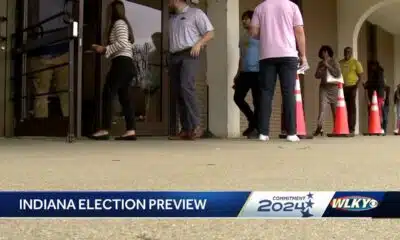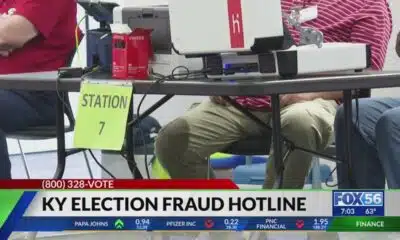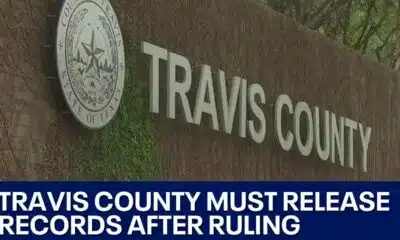Mississippi News
5th Circuit upholds Jim Crow-era law to keep Black Mississippians from voting
5th Circuit upholds Jim Crow-era law written to keep Black Mississippians from voting
Editor’s note: This story contains graphic language.
The U.S. Fifth Circuit Court of Appeals has affirmed a lower court ruling allowing a provision of the 1890 Mississippi Constitution designed to keep African Americans from voting to remain in place.
The provision places a lifetime ban on voting in most instances on people convicted of certain felonies — crimes that the framers of the 1890 state Constitution said Black Mississippians were more prone to commit.
The framers did not disenfranchise people convicted of murder or rape, for instance, but did strip voting rights of people convicted of several “lesser crimes,” which the writers of the Constitution falsely believed would be committed by African Americans.
The “per curiam” or unsigned opinion of the 5th Circuit said because of actions taken by the Legislature in the 1950s and 1960s allowing voters a chance to amend the constitutional provision, among other things adding murder and rape as disenfranchising crimes, the provision no longer has a racist taint.
“Plaintiffs have not demonstrated that Section 241 as it currently stands was motivated by discriminatory intent or that any other approach to demonstrating the provision’s unconstitutionality is viable,” the majority said.
The majority opinion also cited the Legislature taking up the issue in the 1980s and opting not to change it.
The provision was defended on behalf of the state by the office of Attorney General Lynn Fitch.
The Mississippi Center for Justice among other groups brought the lawsuit on behalf of two Black Mississippians who had lost the right to vote: Roy Harness and Kamal Karriem, convicted of forgery and embezzlement, respectively.
“This provision was a part of the 1890 plan to take the vote away from Black people who had attained it in the wake of the Civil War,” said Rob McDuff, director of the Impact Litigation Project at the Mississippi Center for Justice. “Unfortunately, the Court of Appeals is allowing it to remain in place despite its racist origins. Despite this setback, we will continue this battle and seek review in the U.S. Supreme Court.”
The case was considered by 17 members of the U.S. 5th Circuit Court of Appeals, considered one of the most conservative judiciaries in the nation. Oral arguments were held in the case in September 2021 in New Orleans.
In a statement, Fitch’s office said, “We are pleased with the court’s decision. As the court noted, ‘Plaintiffs’ proposal that a state constitutional amendment must be voted on word for word to avoid any vestigial racial taint is radically prescriptive…. No subsequent case law supports plaintiffs’ novel, judicially crafted political theory of public consent.'”
”Seven of the 17 members dissented with the majority opinion. Circuit Judge James Graves Jr., previously a member of the Mississippi Supreme Court, wrote a lengthy dissent detailing the state’s sordid racist past, including events from the 1960s when the Legislature allowed the electorate to vote on the constitutional provision. That vote allowed murder and rape to be added as disenfranchising crimes, but did not give the electorate the opportunity to vote on whether other changes needed to be made to the provision or whether the entire Jim Crow provision should be stricken from the Constitution.
As part of Graves’ history of the state’s racial past, he cited progress that led to the election of Black officials — including him as a judge — and led to the replacement of the old Mississippi state flag that contained the Confederate battle emblem as part of its design.
Citing that the state had not been allowed to vote on the provision, Graves wrote: “Mississippians have simply not been given the chance to right the wrongs of its racist origins. And this court … deprives Mississippians of this opportunity by upholding an unconstitutional law enacted for the purpose of discriminating against Black Mississippians on the basis of race.”
In his opening, Graves quoted segregationist former Mississippi Gov. James K. Vardaman.
“There is no use to equivocate or lie about the matter … Mississippi’s constitutional convention of 1890 was held for no other purpose than to eliminate the nigger from politics … In Mississippi we have in our Constitution legislated against the racial peculiarities of the Negro … When that device fails, we will resort to something else.”
In Mississippi, people with felony convictions must petition the Legislature to get a bill passed by a two-thirds majority of both chambers to regain voting rights. Normally only a handful (less than five) of such bills are successful each session. There is also the option of the governor granting a pardon to restore voting rights, but no governor has granted pardons since Haley Barbour in 2012.
For a subset of those who lose their rights, the courts can expunge their record. In some instances that expungement includes the restoration of voting rights, while for others it does not. That outcome depends on the preference of the judge granting the expungement.
Those crimes placed in the Constitution where conviction costs a person the right to vote are bribery, theft, arson, obtaining money or goods under false pretense, perjury, forgery, embezzlement, bigamy and burglary.
Under the original language of the Constitution, a person could be convicted of cattle rustling and lose the right to vote, but those convicted of murder or rape would still be able to vote — even while incarcerated.
This article first appeared on Mississippi Today and is republished here under a Creative Commons license.
Mississippi News
Suspect in Charlie Kirk assassination believed to have acted alone, says Utah governor
SUMMARY: Tyler Robinson, 22, was arrested for the targeted assassination of conservative activist Charlie Kirk in Orem, Utah. Authorities said Robinson had expressed opposition to Kirk’s views and indicated responsibility after the shooting. The attack occurred during a Turning Point USA event at Utah Valley University, where Kirk was shot once from a rooftop and later died in hospital. Engravings on bullets and chat messages helped link Robinson to the crime, which was captured on grim video. The killing sparked bipartisan condemnation amid rising political violence. President Trump announced Robinson’s arrest and plans to award Kirk the Presidential Medal of Freedom.
The post Suspect in Charlie Kirk assassination believed to have acted alone, says Utah governor appeared first on www.wjtv.com
Mississippi News
Americans mark the 24th anniversary of the 9/11 attacks with emotional ceremonies
SUMMARY: On the 24th anniversary of the 9/11 attacks, solemn ceremonies were held in New York, at the Pentagon, and in Shanksville to honor nearly 3,000 victims. Families shared personal remembrances, emphasizing ongoing grief and the importance of remembrance. Vice President JD Vance postponed his attendance to visit a recently assassinated activist’s family, adding tension to the day. President Trump spoke at the Pentagon, pledging never to forget and awarding the Presidential Medal of Freedom posthumously. The attacks’ global impact reshaped U.S. policy, leading to wars and extensive health care costs for victims. Efforts continue to finalize legal proceedings against the alleged plot mastermind.
The post Americans mark the 24th anniversary of the 9/11 attacks with emotional ceremonies appeared first on www.wcbi.com
Mississippi News
Hunt for Charlie Kirk assassin continues, high-powered rifle recovered
SUMMARY: Charlie Kirk, conservative influencer and Turning Point USA founder, was fatally shot by a sniper during a speech at Utah Valley University on September 10, 2025. The shooter, believed to be a college-aged individual who fired from a rooftop, escaped after the attack. Authorities recovered a high-powered rifle and are reviewing video footage but have not identified the suspect. The shooting highlighted growing political violence in the U.S. and sparked bipartisan condemnation. Kirk, a Trump ally, was praised by political leaders, including Trump, who called him a “martyr for truth.” The university was closed and security heightened following the incident.
The post Hunt for Charlie Kirk assassin continues, high-powered rifle recovered appeared first on www.wjtv.com
-
News from the South - Alabama News Feed6 days ago
Alabama lawmaker revives bill to allow chaplains in public schools
-
News from the South - Missouri News Feed7 days ago
1587 Prime gives first look at food, cocktail menu ahead of grand opening in KC
-
News from the South - Arkansas News Feed7 days ago
‘One Pill Can Kill’ program aims to reduce opioid drug overdose
-
Mississippi News Video7 days ago
Interview: Come see Baptist at WTVA Senior Health Fair
-
News from the South - Arkansas News Feed6 days ago
Arkansas’s morning headlines | Sept. 9, 2025
-
News from the South - Missouri News Feed6 days ago
Pulaski County town faces scrutiny after fatal overdose
-
News from the South - Texas News Feed6 days ago
‘Resilience and hope’ in Galveston: 125 years after greatest storm in US history | Texas
-
News from the South - Georgia News Feed7 days ago
Man tries to save driver in deadly I-85 crash | FOX 5 News





















































